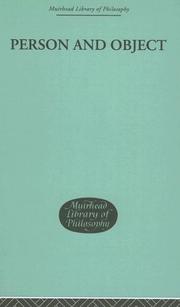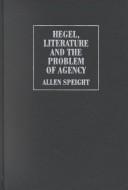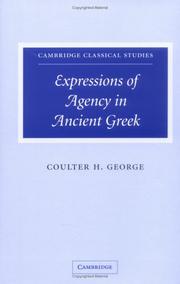| Listing 1 - 4 of 4 |
Sort by
|

ISBN: 1138884200 1315830221 1317852230 9781317852230 1306854369 9781306854368 9781315830223 0415295939 9780415295932 9780415295932 0875483410 9780875483412 9781317852216 9781317852223 9781138884205 1317852222 Year: 2013 Publisher: London ; New York : Routledge,
Abstract | Keywords | Export | Availability | Bookmark
 Loading...
Loading...Choose an application
- Reference Manager
- EndNote
- RefWorks (Direct export to RefWorks)
First published in 2002. Routledge is an imprint of Taylor & Francis, an informa company.
Personalism. --- Agent (Philosophy) --- Self (Philosophy) --- Object (Philosophy) --- Metaphysics. --- Philosophy --- God --- Ontology --- Philosophy of mind --- Agency (Philosophy) --- Agents --- Person (Philosophy) --- Act (Philosophy) --- Individualism --- Personality --- Personnalisme --- Agent (Philosophie) --- Moi (Philosophie) --- Objet (Philosophie) --- Métaphysique --- Personalism --- Metaphysics

ISBN: 0521791847 0521796342 0511018150 0511154402 051104691X 0511174462 1280430095 0511612834 0511302320 110712171X 9780511018152 9780521791847 9780521796347 9780511612831 9780511046919 9780511154409 Year: 2001 Publisher: Cambridge Cambridge University Press
Abstract | Keywords | Export | Availability | Bookmark
 Loading...
Loading...Choose an application
- Reference Manager
- EndNote
- RefWorks (Direct export to RefWorks)
Hegel's Phenomenology of Spirit has attracted much attention recently from philosophers, but none of the existing English-language books on the text addresses one of the most difficult questions the book raises: Why does the Phenomenology make such rich and provocative use of literary works and genres? Allen Speight's bold contribution to the debate on the work of Hegel argues that behind Hegel's extraordinary appeal to literature in the Phenomenology lies a philosophical project concerned with understanding human agency in the modern world. It shows that Hegel looked to three literary genres - tragedy, comedy, and the Romantic novel - as offering privileged access to three moments of human agency: retrospectivity, theatricality, and forgiveness. Taking full account of the authors whom Hegel himself refers to (Sophocles, Diderot, Schlegel, Jacobi), Allen Speight has written a book with a broad appeal to both philosophers and literary theorists.
Hegel, Georg W.F. --- Literature --- Agent (Philosophy) --- Littérature --- Agent (Philosophie) --- Philosophy --- History --- Philosophie --- Histoire --- Hegel, Georg Wilhelm Friedrich, --- Agent (Philosophy). --- Hegel, Georg Wilhelm Friedrich. --- Literature. --- Philosophy & Religion --- Philosophy. --- Littérature --- Agency (Philosophy) --- Agents --- Person (Philosophy) --- Literature and philosophy --- Philosophy and literature --- Theory --- Act (Philosophy) --- History. --- Arts and Humanities --- Literature - Philosophy --- Hegel, Georg Wilhelm Friedrich, - 1770-1831 - Phänomenologie des Geistes
Book
ISBN: 1107192676 9781107192676 9781108131629 9781316642610 1316642615 1108136818 110813663X 1108135552 1108137172 1108136990 110813789X 110813162X 9781108137898 Year: 2017 Publisher: Cambridge Cambridge University Press
Abstract | Keywords | Export | Availability | Bookmark
 Loading...
Loading...Choose an application
- Reference Manager
- EndNote
- RefWorks (Direct export to RefWorks)
This book presents a comprehensive examination of Gottfried Leibniz's views on the nature of agents and their actions. Julia Jorati offers a fresh look at controversial topics including Leibniz's doctrines of teleology, the causation of spontaneous changes within substances, divine concurrence, freedom, and contingency, and also discusses widely neglected issues such as his theories of moral responsibility, control, attributability, and compulsion. Rather than focusing exclusively on human agency, she explores the activities of non-rational substances and the differences between distinctive types of actions, showing how the will, appetitions, and teleology are key to Leibniz's discussions of agency. Her book reveals that Leibniz has a nuanced and compelling philosophy of action which has relevance for present-day discussions of agency. It will be of interest to scholars and students of early modern philosophy as well as to metaphysicians and philosophers of action.
Causation --- Agent (Philosophy) --- Act (Philosophy) --- Leibniz, Gottfried Wilhelm, --- Causalité --- Agent (philosophie) --- Acte (métaphysique) --- Causalité. --- Causation. --- Action (Philosophy) --- Philosophy --- Agency (Philosophy) --- Agents --- Person (Philosophy) --- Causality --- Cause and effect --- Effect and cause --- Final cause --- Beginning --- God --- Metaphysics --- Necessity (Philosophy) --- Teleology --- Leibnitz, Gottfried Wilhelm --- Leibniz, Gottfried Wilhelm --- Causalité. --- Acte (métaphysique)

ISBN: 9780521847896 0521847893 9780511482984 9780511199233 0511199236 0511134541 9780511134548 9780511136733 0511136730 0511482981 1107152879 128042236X 0511182023 051129994X Year: 2005 Volume: *59 Publisher: Cambridge Cambridge university press
Abstract | Keywords | Export | Availability | Bookmark
 Loading...
Loading...Choose an application
- Reference Manager
- EndNote
- RefWorks (Direct export to RefWorks)
Ancient Greek expressed the agents of passive verbs by a variety of means, and this work explores the language's development of prepositions which marked the agents of passive verbs. After an initial look at the pragmatics of agent constructions, it turns to this central question: under what conditions is the agent expressed by a construction other than hupo with the genitive? The book traces the development of these expressions from Homer through classical prose and drama, paying attention to the semantic, syntactic, and metrical conditions that favoured the use of one preposition over another. It concludes with a study of the decline of hupo as an agent marker in the first millennium AD. Although the focus is on developments in Greek, translation of the examples should render it accessible to linguists studying changes in prepositional systems generally.
Agent (Philosophy) --- Greek language --- Passive voice. --- Prepositions. --- Verb. --- Agent (Philosophy). --- Prepositions --- Passive voice --- Verb --- Grec (langue) --- Prépositions --- Voix passive --- Verbes --- Grec (Langue) --- Agent (Philosophie) --- Prépositions --- Passif --- Verbe --- Agency (Philosophy) --- Agents --- Person (Philosophy) --- Act (Philosophy) --- Philosophy --- Classical languages --- Indo-European languages --- Classical philology --- Greek philology --- Prépositions. --- Voix passive. --- Verbes. --- Arts and Humanities --- History --- Greek language - Prepositions --- Greek language - Passive voice --- Greek language - Verb --- Prépositions.
| Listing 1 - 4 of 4 |
Sort by
|

 Search
Search Feedback
Feedback About UniCat
About UniCat  Help
Help News
News